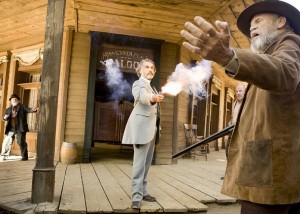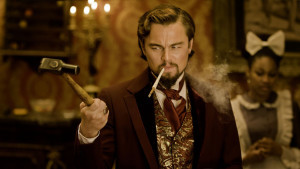Stricken with a high octane of controversy from the moment it hit theatres, Quentin Tarantino’s latest effort manages to deliver in standard Tarantino fashion. Released on Christmas Day 2012, “Django Unchained” received a score of criticism from the upper ranks of the African-American community – including Nation of Islam leader Louis Farrakhan who called it “preparation for race war,” and Tarantino’s fellow filmmaker Spike Lee and his well documented refusal to watch it.
Much of the maligned criticism of “Django Unchained” stems from several fronts, the most glaring being the overabundant use of the “N” word (over one-hundred times), which Tarantino has attempted to diffuse by reminding critics of the context and accuracy of the way people spoke in the Deep South during that time period. Going into “Django Unchained,” one may feel the movie is an accurate and historical representation of the American south in the 1850s but make no mistake about it – “Django Unchained” is not “Roots.” It is a movie done strictly for entertainment purposes (mirroring the criticism of Lee and others) and not an accurate depiction of slavery.
“Django Unchained” contains a litany of Tarantino trademarks, including titles on screen identifying dates and places, and cartoonish violence so over the top it would be akin to comparing the RMS Titanic to a Sea-Doo. The cartoonish song that opens the film should immediately identify this as anything other than a documentary witnessed by a Junior High Social Studies class.
The story unfolds in the Texas outback in 1858 – in the years before the beginning of the Civil War. A loquacious and charismatic German stranger identifying himself as Dr. King Schultz (Christopher Waltz) interrupts the transport of a group of slaves. Schultz works his eloquent and charming nature to identify a slave in the transport by the name of Django (Jamie Foxx) and then attempts in vain to purchase him from his owners. When they refuse, the first of the films wanton bloodbaths occurs, leaving several corpses in the wake and Waltz and Django riding off together into the night. Schultz then explains to Django that, though a dentist by trade, he has not practiced in several years. He is now a bounty hunter who gets paid by the state to track down and kill wanted men. “Like slavery, it’s a flesh for cash business,” he comically explains. Schultz needs Django to make a positive identification on three wanted men that work on Django’s former plantation and in exchange will grant him his freedom.
Django and Schultz form a tight and unconventional bond, beginning as partners and turning to friends. Schultz teaches Django the art of bounty hunting, which he quickly masters, and the pair agrees to work together over the winter before heading to the bowels of Mississippi on a mission to free Django’s wife Hildi (Kerry Washington), where she is a slave at a notoriously abusive plantation owned by the wicked Calvin Candie (Leonardo DiCaprio.)
 Despite the negatives, “Django Unchained” received five nominations for the Academy Award, and took home two – ‘Best Screenplay’ and ‘Best Supporting Actor’ for Christopher Waltz. The acting from the primary characters is superior, with Waltz rightfully deserving the top credit and the award (despite Jamie Foxx’s titular character, one could easily argue that Dr. King Schultz is the main star of the movie.) Leonardo DiCaprio dazzles in the role of the sleazy Calvin Candie, demonstrating his great versatility and staying power as one of Hollywood’s best stars. I used to mock his less-than-stellar performance as Jack Dawson in “Titanic,” and now find myself excited at the idea of watching DiCaprio and his career continue for decades to come as a star from my generation and age-bracket.
Despite the negatives, “Django Unchained” received five nominations for the Academy Award, and took home two – ‘Best Screenplay’ and ‘Best Supporting Actor’ for Christopher Waltz. The acting from the primary characters is superior, with Waltz rightfully deserving the top credit and the award (despite Jamie Foxx’s titular character, one could easily argue that Dr. King Schultz is the main star of the movie.) Leonardo DiCaprio dazzles in the role of the sleazy Calvin Candie, demonstrating his great versatility and staying power as one of Hollywood’s best stars. I used to mock his less-than-stellar performance as Jack Dawson in “Titanic,” and now find myself excited at the idea of watching DiCaprio and his career continue for decades to come as a star from my generation and age-bracket.
Alongside violence and carnage, another synonymous aspect with Tarantino’s films is actor Samuel L. Jackson who has appeared in six of them to date (including “True Romance” which was written by Tarantino.) While Jackson is notorious as a scene stealing camera hog, his role in “Django” as the loyal house slave Stephen is hilarious and kept properly in check by the brilliance of DiCaprio and Waltz.
If you can tolerate the language and gore, my only real complaint is the length of the film. Though fast paced, its running time of 165 minutes is a touch too long, and several scenes could have been trimmed down to shorten it to a more plausible length. Even the ending manages to come one sequence too late. Nevertheless, “Django Unchained” is a very good movie and well worth watching.
– by Matt Christopher



1 Comment
yes I agree the kitchen scene could have used a large trim, nice review Matt